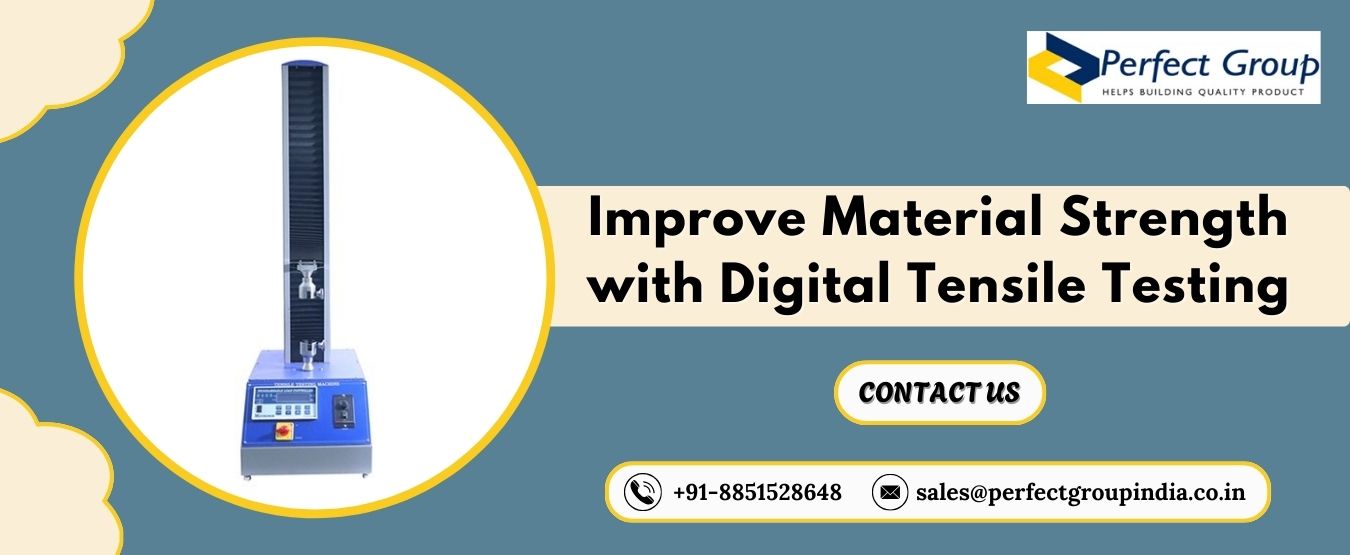Improve Material Strength with Digital Tensile Testing
Introduction
Digital tensile testing measures the amount of force a material can survive before it breaks, its strength, flexibility and general durability under pressure. Mechanical testing is a process by which manufacturers confirm that their products have the capability of being strong, functional and providing enough service. It will also help them identify the right materials for different roles, be they textiles, metals, plastics, or packaging. The knowledge of tensile properties helps avoiding failures and improvements in quality. Modern testing equipment provides accurate data that makes it easier to maintain high standards. Perfect Group India provides a number of innovative techniques for improving material quality. The accurate measuring procedure helps manufacturers promote a quality product, reduce waste and meet standards.
What is Digital Tensile Testing?
The purpose of Digital tensile testing is to measure a material's quality when under pressure. It calculates the amount of force needed to stretch the material until it breaks. Tensile strength, stretching and other mechanical features can be analyzed by this test. Thanks to advanced digital technology, it provides a specific trust of reliability and accuracy in terms of the testing methodology. Because of this, this tool is highly useful for quality control.
Importance of Digital Tensile Testing
• Increased Material Quality: Knowledge of the tensile strength of every material lets manufacturers select materials with the best features for production.
• Ensures Product Durability: Durable performance is guaranteed by identifying weak materials, which avoids product failure.
• Support for Industry Standards: Equipment helps businesses meet national and international quality standards.
• Reduced Material Wastage: The measurement of strengths and qualities of various materials allows manufacturers to use the inputs better.
• Improved Safety: In the automotive and construction sectors, testing materials beforehand of production reduces risk.
How Digital Tensile Testing Works
A sample material is placed between two grips as part of the equipment process. The material expands until it fractures using a controlled force. The instrument records several parameters, including:
• Maximum Load Capacity: The utmost force the material can withstand before fracturing.
• Elongation Percentage: The one that determines how much the material increases before breaking.
• Strength: The point at which a material starts to always break down.
Industries Benefiting from Digital Tensile Testing
1. Automotive Industry
Digital tensile testing has been used to measure the performance and safety of metals, polymers and composites used in vehicle manufacturing; materials should, in fact, be able to withstand extreme environmental conditions.
2. Construction and Infrastructure
In construction, the materials are strong enough to construct roads, bridges and multifunctional buildings. Engineers can select the best materials for strong structure with the help of testing.
3. Packaging Industry
This device is used by packaging manufacturers to measure the strength of cardboard, plastic films and paper. By doing this, packaging failures during transportation and storage are avoided.
4. Textile Industry
In the textile industry, fabric strength is important. This equipment guarantees high-quality products by choosing how textiles perform under pressure.
5. Aerospace and Defense
Extreme forces must be allowed by materials used in defense and aircraft usage. The quality of the parts used by these sectors is guaranteed by Perfect Group India.
Features of Advanced Machines
Modern machines come with advanced features that improve productivity and accuracy, such as:
• High-Precision Load Cells: Provide accurate force measurements.
• User-Friendly Digital Display: Easy use results and data storage.
• Multiple Testing Modes: Supports various types of tensile tests for different materials.
• Automated Operation: Reduces human error and increases testing performance.
• Robust Software Integration: Allows real-time monitoring and data analysis.
Different Types of Testing Process
1. Uniaxial Tensile Testing
The simplest method, which involves stretching a material in a single direction to determine its tensile strength.
2. Biaxial Tensile Testing
Used for materials like textiles and thin films that are exposed to stress in several directions.
3. Creep Testing
investigates the sustained stretching of a material under a continuous load.
4. Tear Testing
to measure the material quality to tearing; this is of significance to flexible materials like textiles and packaging films.
Key Factors Affecting Testing Results
• Temperature and Humidity: Environmental factors can influence material behavior.
• Specimen Preparation: Proper sample cutting and alignment affect accuracy.
• Testing Speed: The rate at which the force is applied impacts results.
• Machine Calibration: Regular calibration improves accurate results.
Why Choose Perfect Group India for Digital Tensile Testing Solutions?
Perfect Group India focuses on offering outstanding equipment that is designed to last. Industries all over India choose our machines because of their unique dependability and performance. We help companies meet exact quality standards and increase material strength with modern technology.
The Future of Digital Tensile Testing
• AI Integration: Artificial intelligence improves testing accuracy and predictive analysis.
• IoT Connectivity: Internet-connected devices provide the remote monitoring of test results.
• Eco-Friendly Materials Testing: Testing a focus on sustainable materials compliant with the environment.
Conclusion
Digital tensile testing allows for the measurement of a material's strength, durability, flexibility and reliability in a range of industries. The technique helps industries maintain quality by providing an accurate measurement of a substance's ability to pressure. Industries could choose materials for construction, packaging and other functions by examining their tensile features. The testing process is dependable and productive thanks to modern technology. Outstanding solutions are provided by Perfect Group India to help industries improve the performance of their products. Investing in proper tensile testing guarantees future dependability, productivity and safety. Tensile testing helps for quality improvement and innovation because stronger materials manufacture better products.
